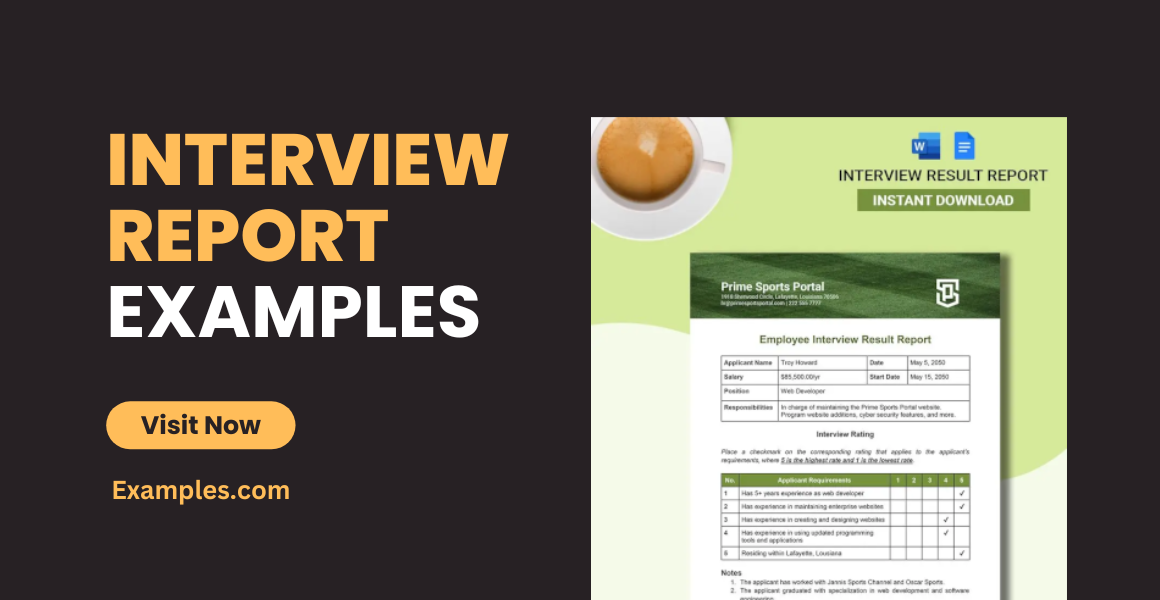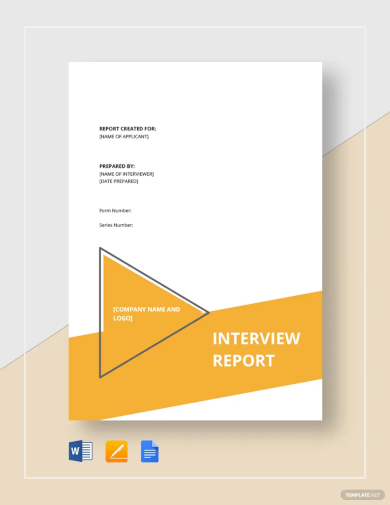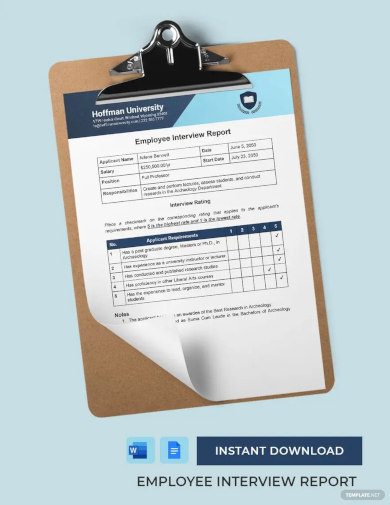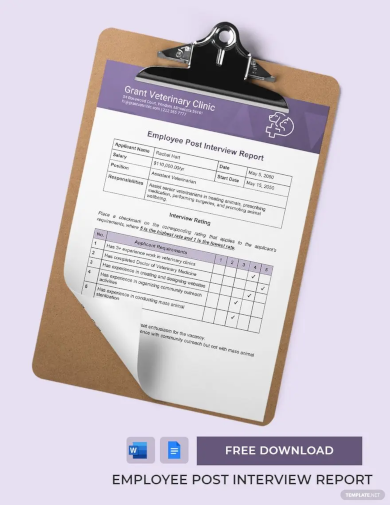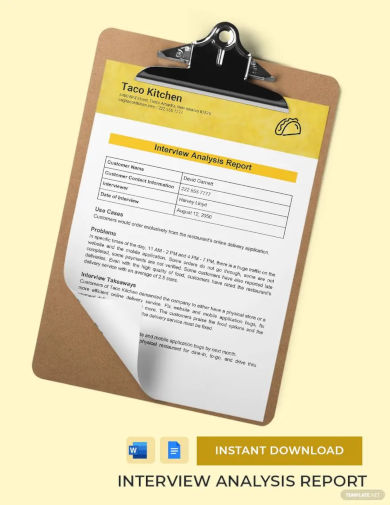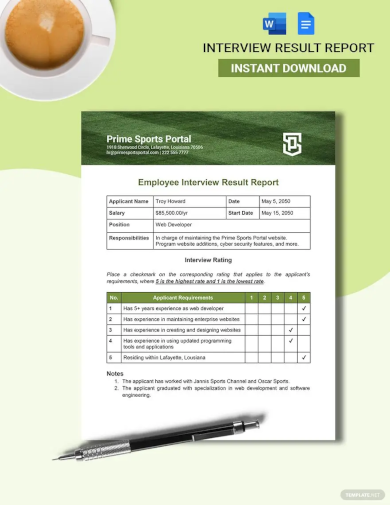How To Write An Interview Report?
So you were asked to do an interview report. You have no idea how to do it but you took the task anyway since you love meeting new people. Conducting interviews may be fun and interesting, but the most important part is the lessons you learn from it. You also get to know new knowledge from the person you interview and you get to write down what they’ve said. Here are some tips for helping you do an interview report.
Interview Report Examples
Interview Report Template
Job Interview Report
Free Post Interview Report
Interview Analysis Report
Interview Result Report
1. Preparation for the interview
Preparing for an interview that you will conduct is one of the most important aspects to consider. You don’t want to go interview your subject without any idea what to do. Like a soldier preparing for battle, you need to ready yourself with the basic tools and knowledge you need in conducting an interview. The first thing to do is to decide who you will be interviewing.

Depending on the subject matter or theme of your interview report; you can ask someone who is an expert in that field or who has personal experiences. For example, if your interview is about thermal energy; you may approach a physics professor to ask share his own expertise on the matter. Once you’ve confirmed your interviewee, the next thing to do is to set up a date and place of where the interview will be held.
Make sure the place you chose is perfect in conducting interviews. The place should be public and not too noisy. One example could be conducting an interview in a coffee shop. You may also see Interview Evaluation Examples.
Also prepare yourself mentally when you are going to conduct your interview. Conducting interviews is a multi-tasking job. You listen and take down notes.
Research the subject and use this information to write down questions you want to ask, but understand you probably will need to ask follow-up questions. Prepare for your interview ahead of time and tape your interview if possible, because you will not be able to write down everything your interviewee says. As soon as you complete the interview, write down your thoughts and notes from the interview while it is fresh in your mind.
You may think you will remember all the details from the interview, but you won’t. When you are ready to begin writing up the interview, use your tape recorder to help you. Prepare your questions and the tools you need when you are going to have the interview. You may also see Interview Email Examples.
2. Do some background research
Before conducting an interview, research any information related to the topic of the interview. You can also research the background information of your interviewee so you know what questions to formulate. You don’t want to sound ignorant, and some interviewees don’t have time to explain everything. You may also see Interview Schedule Examples.
Example:
You will be interviewing a singer-songwriter, so do some background research about his work; his songs and compositions. You can also gather information from what label he belongs and what kind of music is he an expert in. You can formulate your questions through your research. You may also see Job Interview Tips.
3. Make some questions
If you’re done doing your research, read and try to absorb the information needed for you to make your set of questions. You can also ask them additional questions that are not part of your research just to get additional background information from the person.
The best kind of questions is open-ended questions that invite the interviewee to talk about themselves. People love it when you ask them about themselves or their interests. They can freely talk about it if you make your questions concise and specific. Also, avoid asking personal questions unless you are authorized to do it. Be careful of what questions you are going to ask; don’t be offensive or mean.
Example: You will be asking the singer-songwriter what kind of music is he into, and the reasons why he was into that music in the first place.
Of course, in every interview, you may need to do some follow-up questions. Connect your questions logically. Meaning, your follow up questions must relate to answers that need clarification.
Example: If he answered he was into new wave and punk music, ask him who are his favorite artists in those genres.
4. Stick to the subject of the interview
Make sure your interview has a purpose. If the purpose is to elaborate the craftsmanship of the singer-songwriter’s musical abilities, then stick to it. Don’t ask him about any other topic like his personal life or how many pets he has. Make sure your questions (and the follow-up ones) don’t stray from your main agenda of the interview. Don’t forget to simplify your questions to avoid confusion from your interviewee.
6. Prepare your materials
Once you’ve formulated your questions, it’s time to prepare the materials you need in conducting your interview. Prepare the following materials you may use; smartphone, tape recorder (to record your interview but ask permission first if it’s okay to record your interview), pen, paper (for note-taking), notebook (where you keep your questions). Don’t forget to keep their contacts and their phone numbers or e-mails just in case if you need some clarifications from the interview. Out of courtesy, you can also thank them for the interview.

5. Practice your interview
If you’re not used to giving out interviews– practice, practice, practice. You may practice with a family member, a friend, or anyone who is willing to sit down and help you out. This way you’ll get to see whether your questions make sense, you’ll be aware of how you conduct your interview and make some changes to your pre-interview questions. That way, you won’t make a fool out of yourself once you get to do the actual interview.
7. Decide what format to use
When you are done with your interview notes, decide on what format your interview paper will be. If your instructor assigned you the format to use, you can skip this step. However, if they haven’t specified a format to use or told you that any format will do, you need to do some decision making. You can choose any of these two formats– the question & answer format or the narrative format. This will affect how you organize your report.
- Question and Answer Format
In the question and answer format (Q & A), you should begin with a paragraph about the interviewee as an introduction. Write a brief background about the interview, the place where you conducted the interview and the subject or themes of your interview. After, the interview itself will be written out.
Use your two initials as an interviewer, and two for your interviewee after the first question and answer. The initials of the person speaking are written first then followed by what the person answers. There’s no need for quotation marks. A brief concluding paragraph may also use to wrap things up at the end of the report. This is an easier and fun format to use if your interviewee was talkative and gathered lots of great quotes you can use.
Example:
Fay Lucille and I were in a local coffee shop talking about her years a stage actress in New York. We were talking about her early beginnings all the way to her successful years in Broadway until her firstborn child was born and she retreated from the theater world. Now being in her late 30s and having born 3 children, she’s making a comeback on the stage once again.
The Interviewee: When you were a child, were you already interested in acting?
Fay Lucille: Yes I was. I remember when I was about 9 years old, I saw the movie Gone with the Wind, and I was struck by it. The acting was so good, the plot was so touching, I was inspired by their performances that I wanted to become an actress on screen.
T. I.: Did it occur to you that you want to be a stage actress to?
F.L.: Funnily enough, I didn’t want to act on stage. I’m not into practicing lines and movements for weeks or even months. When I was a kid, I was impatient. I want things to happen right away. That changed when I got older.
- Narrative Format
However, if you’re interviewee is not totally talkative or there weren’t lots of good quotes that he gave you, you are better off writing your report using a narrative format. In this format, you can make use of the notes you wrote down before and after you conducted your interview to flesh out the report. In the first paragraph of this format, write a brief detail about what the report is about, who the interviewee is, and the location of the interview. Then break up the interview into paragraphs, just like narrating a story and then use the selected quotes that you have to help you. Make a conclusion paragraph to end your report. In this format, you need to use a quotation mark when quoting your interviewee.
Example:
Karina Bates and I have always been good pals. Karina is a cat lover and owns three lovely cats: Alex, Rami and Kaye. In our time together at her ranch house, she tells her tales of her time spent with her feline friends.
“I absolutely adore and love them all and I can’t imagine how sad my life would be without them,” she said. She refers to her times when they all got sick and she was afraid of losing them.
Both formats need a good introduction, an organized body and a solid takeaway for a conclusion. Now that you’ve gathered the information you needed in your report, it’s time to outline your interview report.

8. Write down the outline of your interview report
This report outline will help you write your paragraphs in both narrative and Q&A format. Below is the sample outline to follow:
I. Introduction
Start with a humorous or interesting anecdote or fact that the person told you. Detail out who was interviewed, what are they are known for, and the main purpose of the interview. Think of the question; what do you plan to tell your reader about this person? This should be included in the introduction. Make sure you got the correct spelling of the interviewee’s name and the correct information about the interviewee.
II. Paragraph 1: the questions you’ve asked and first big idea you learned
III. Paragraph 2: second big idea you learned from the interviewee
IV. Paragraph 3: third big idea you learned from the interviewee
V. Conclusion: wrap the report by summarizing and putting down a concluding observation about the person
And now you’ve mastered the art of gathering information from interviews, it’s time get down to it and write. As you’ve done the process, you will be amazed at how much you’ve learned from your interviewees. Conducting an interview is a good way to get to meet people and know more about them.


